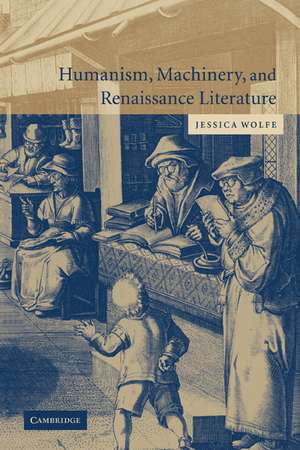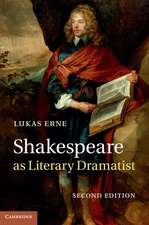Humanism, Machinery, and Renaissance Literature
Autor Jessica Wolfeen Limba Engleză Paperback – 16 dec 2009
| Toate formatele și edițiile | Preț | Express |
|---|---|---|
| Paperback (1) | 363.90 lei 6-8 săpt. | |
| Cambridge University Press – 16 dec 2009 | 363.90 lei 6-8 săpt. | |
| Hardback (1) | 698.84 lei 6-8 săpt. | |
| Cambridge University Press – 2 mai 2004 | 698.84 lei 6-8 săpt. |
Preț: 363.90 lei
Nou
Puncte Express: 546
Preț estimativ în valută:
69.63€ • 72.90$ • 57.62£
69.63€ • 72.90$ • 57.62£
Carte tipărită la comandă
Livrare economică 05-19 aprilie
Preluare comenzi: 021 569.72.76
Specificații
ISBN-13: 9780521123761
ISBN-10: 0521123763
Pagini: 320
Dimensiuni: 152 x 229 x 18 mm
Greutate: 0.47 kg
Ediția:New.
Editura: Cambridge University Press
Colecția Cambridge University Press
Locul publicării:Cambridge, United Kingdom
ISBN-10: 0521123763
Pagini: 320
Dimensiuni: 152 x 229 x 18 mm
Greutate: 0.47 kg
Ediția:New.
Editura: Cambridge University Press
Colecția Cambridge University Press
Locul publicării:Cambridge, United Kingdom
Cuprins
Acknowledgements; Introduction: subtle devices: renaissance humanism and its machinery; 1. Automatopoesis: machinery and courtliness in renaissance Urbino; 2. Artificial motions: machinery, courtliness, and discipline in renaissance England; 3. Inanimate ambassadors: the mechanics and politics of mediation; 4. The polymechany of Gabriel Harvey; 5. Homer in a nutshell: Chapman and the mechanics of perspicuity; 6. Inhumanism: Spenser's iron man; Conclusion.
Recenzii
'Individual scholars interested in the idea of mechanism or the mechanical in the Renaissance, or more generally in history of our understanding of machines, will find it an extremely useful place to start or continue their studies …' Studies in Medieval and Renaissance Teaching
Descriere
This book explores how mechanics participate in the intellectual culture of Renaissance humanism.
















